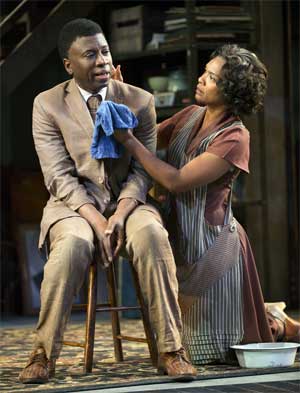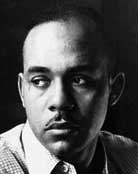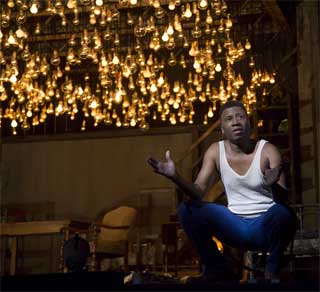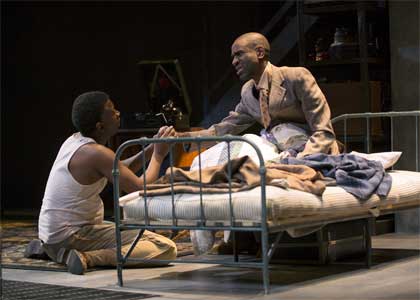Play (2012)
Adapted for the stage by Oren Jacoby
Based on the novel (1952) of the same name by Ralph Ellison
Directed by Christopher McElroen
Huntington Theatre Company
Boston University Theatre
Boston, MA
January 4 – February 3, 2013
With McKinley Belcher (Trueblood), Teagle F. Bougere (Invisible Man), Brain D. Coats (Grandfather, Burnside, Peter Wheatstraw), Johnny Lee Davenport (Preacher, Bledsoe, Brockway), De’Lon Grant (Ralston, Tod Clifton), Edward James Hyland (Mr. Norton, Brother Hambro), Joy Jones (Slave Girl, Mattie-Lou, Old Woman), Jeremiah Kissel (MC, Emerson, Jr. Brother Jack), Deidra LaWan Starnes (Singer, Kate, Mary Rambo), Julia Watt (Stripper, Emma, Woman in Red)

Deidra LaWan Starnes as Mary
in “Invisible Man”
Photo T. Charles Erickson
Courtesy Huntington Theatre Company
“Invisible Man” is the only name we have for the main character of this detailed odyssey, which traces him from schoolboy in the rural South to activist in the urban North, and through much psychological and socio-political terrain in between.
This dramatized version of Ellison’s celebrated 1952 novel touches on just about every episode in it. In a pitch for authentic representation, Oren Jacoby, who adapted the novel for the stage, apparently used only Ellison’s words for dialogue, not inventing any himself.
This attempt at full representational authenticity has its price. The production runs for an exceedingly full three hours as it navigates through all the plot details.

Apparently Ellison modeled Invisible Man, at least to some extent, on Dostoevsky’s philosophical novella, Notes From the Underground (1864), a dire, symbolic tale about a man whose subterranean habitation is expressive of his mental and emotional isolation. Dostoevsky’s novella is reflective of Existentialist trends of late nineteenth century Europe (also vivid, during that era, in the writings of Soren Kierkegaard and Friedrich Nietzsche), with a particularly nihilist twist attributable to the social and psychological subjections of Czarist Russia.
Akin to Dostoevsky’s underground protagonist, in Ellison’s novel, Invisible Man begins and ends the narrative in an underground hideaway lit by thousands of bulbs with power lifted from a monopolistic energy company’s circuits.

in “Invisible Man”
Photo: T. Charles Erickson
Courtesy Huntington Theatre Company
The torment of an African-American man in mid-twentieth century, alienated by oppressive whites and complicit blacks, and derailed by political invovlements gone awry, frames the story. Invisible Man, isolated and driven underground, becomes, in the context of this history, the tragic antihero who strains for dignity despite his inability to discover a vehicle for social hope.
This adaptation represents an earnest effort on the part of playwright Oren Jacoby to do justice to the novel, but the result, though true to the details of the narrative, is overly long and dramatically unwieldly.
I was struck, while watching this rendering of the novel’s sequences, how different the demands of drama are from those of fiction. What, in a novel, conveys meaning is an accumulated sense of a protagonist’s circumstance and consciousness. In drama, there is barely enough time to gather these threads; its demands for literary economy are far more significant.
In the attempt to be true to the novel’s many narrative elements, Jacoby has compiled a work which sacrifices few of its details but which, as a result, loses intensity and focus.
Christopher McElroen’s direction tries energetically to provide the intensity that gets dissipated in the narrative by filling the stage with lots of people, lots of films and many moments of fired up acting. The result of this compensatory effort, however, provides more of a continuing onslaught of impressions than a coherent whole.
For some reason, McElroen chooses to have most of the actors standing around onstage, as ensemble, for most of the performance. I suppose the intent is to suggest the notion of witness, but the result is the sense of overpopulation.
The same is true of the projected videos. Any of them, given reasonable framing, would enhance the action, but there are many of them all at once and they are constantly going, way too much to look at or to take in.

in “Invisible Man”
Photo: T. Charles Erickson
Courtesy Huntington Theatre Company
The actors seemed decent enough, but, except for a single very funny and beautifully executed scene depicting a street person – if I am not mistaken, played by Brian D. Coats – much of the acting got lost in the shuffle.
The issues this play, and Ellison’s novel, represent are significant and important, and one must give credit to the playwright and the production for attempting to deliver a rendition of this now classic work of American literature.
Particularly at the time of year during which we commemorate Martin Luther King, Jr., the issues carry great weight and demand special respect. In the current rendition, however, earnestness does not quite manage to overcome unwieldiness to make this a potent drama. That said, I should note that, at the end of performance I attended, much of the audience rose to its feet enthusiastically, whether inspired by the important underlying message or by the performance itself.
– BADMan
Leave a Reply